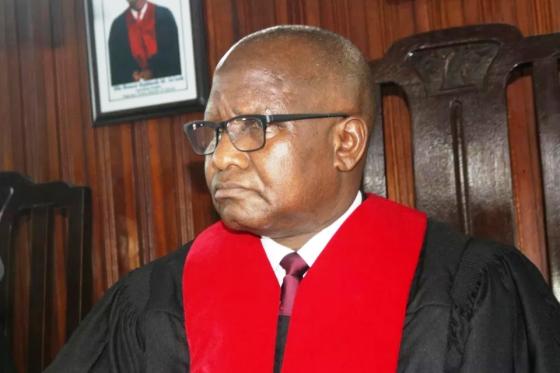Liberia: Rebuking Criticism, Chief Justice Defends Judiciary Again

Chief Justice Francis Korkpor
Chief Justice Francis Kporkpor has once more defended the integrity of the judiciary under his watch — more so his own legacy at the helm — rebuking any perceived criticism of lack of independence.
The Chief Justice's latest defense comes nearly two months after making similar remarks, claiming that the perceived belief among the public that the Judiciary lacks independence is wrong.
But Korkpor, in a more blunt tone this time around, said that the working of the judiciary, particularly where the justices of the Supreme Court are concerned, is not for popularity contests but to rule in accordance with the law, regardless of whether people like the ruling or not.
“We, at the Supreme Court, our decision is final, irreversible, and cannot be entertained at any level; so this is an honorable responsibility,” he said. “We are not there for popularity. Whether they like it or not, the facts of the case are what we go by. [And this is the branch of the government] that holds everything in balance and, without it, the nation will collapse.”
“If you believe in a decision, you have to make it. You alone, even if thousands are against you. Your decision is your decision. At the Supreme Court level, I don't overshadow any decision. Rather, I just have one vote. And if the four to one side, that is it.
“We are getting better results now from the court ruling than how we met it, when most of those practicing were old police and six grade students, among others,” he said.
Korkpor, who was appointed by former President Ellen Johnson Sirleaf, made the statement at the eighth Judicial Circuit during the opening of the August Term of Court in Nimba County — his final judicial function before his retirement in September.
That response may represent a turning point in how he sees criticism of the judiciary — particularly the Supreme Court — which he heads for now, amid the widely held belief in the public that the judiciary lacks independence due to corruption. This public perception is also backed by the US Department of State’s 2021 Country Report on Human Rights.
This is something that the Chief Justice has also alluded to in the past. He condemned judges for being involved in bribery and warned that it harmed the judiciary's reputation.
Last year, Associate Justice Yusuf D. Kaba made it clear to the public that the Judiciary is corrupt — warning that such action risks losing public confidence.
And as he adjusted to the reality of leaving the bench, Korkpor grabbed the opportunity in Nimba at the Eighth Judicial Circuit Court to defend the Supreme Court and Judiciary once more, believing that the criticism stemmed from a profound misunderstanding of the judicial role in public space and saying little on the issue of corruption.
The retiring Korkpor was appointed in 2004 to the Supreme Court of Liberia as Associate Justice for the period of two years, a position to which he was nominated and subsequently reappointed by former President Ellen Johnson Sirleaf in 2006. On April 18, 2013, he took the helm as Chief Justice, after he had served as Chief Justice Ad Interim, following the resignation, in September 2012, of former Chief Justice Johnnie N. Lewis, who requested early retirement due to poor health.
In time past, he has spoken in general terms about the judicial role. In remarks early this year, he addressed what he called criticism of the Judiciary, which he said, is often based on a misperception, when in fact they decide cases according to the constitution and laws without fear or favor and have never lacked independence.
He added that it is not just wrong for Liberians to think that the judiciary as a whole allegedly takes instructions from the Executive and Legislative to make determinations on matters involving the two public institutions. Rather, they should see the judiciary as one that focuses on its primary duty of hearing and deciding cases fairly and impartially, in compliance with the Constitution.
In Nimba, the Chief Justice used the opening to boast of improving the judiciary, through the Judicial Institute program, the whose stated goal is to promote the highest level of professional standards of integrity, competence, and leadership within the Liberian Judiciary.
Korkpor added that when he took over as head of the judiciary, he ensured that the program beneficiaries were all college graduates, who were in turn trained for one year and assigned as associate magistrates to the various magisterial courts, hoping that the next Chief Justice will support the program.
“We are getting better results now from the court ruling than how we met it when most of those practicing were old police and sixth-grade students, among others,” he said.
Meanwhile, he urged judicial actors to get ready and work with the new Chief Justice, something he said will be good for the system.
“I don’t think the President will appoint somebody who does not know the system. I think the person will be well acquainted with the system and that person will require your fullest cooperation,” he said.
“I am leaving and will miss everyone. I will miss everyone as I leave, but no one is indispensable to public office or even any other offices.”
He however vowed to come back in another form in the practice of law, but could not elaborate.
“I admonish you not to underestimate the decision you make. The decision you make determines who becomes a leader, the decision you make determines who goes to jail and regarding who loses his property.”
